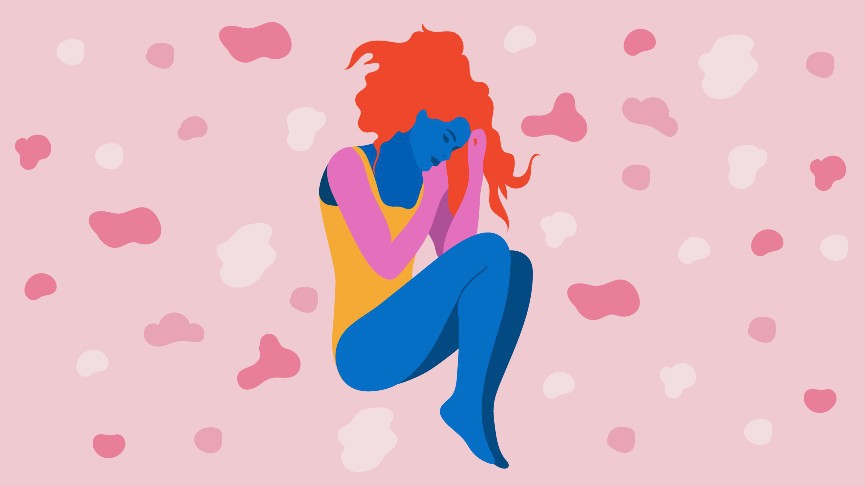Sad After Sex: What is Postcoital Dysphoria?

This article was medically fact-checked by Consultant Obstetrician and Gynaecologist Dr. Shree Datta.
You’ve just had sex and all of a sudden, you find yourself in tears.
Sound familiar?
Whether or not you enjoyed your experience, sex can bring up intense feelings. In the case of postcoital dysphoria, this can look like irritability, sadness, or crying after having sex.
It can be frustrating when these feelings arise and can be difficult to know just where they’re coming from, and what to do about it.
Let’s investigate, and find out more
Post Sex Blues
If you’ve experienced post sex blues, you’re not alone. Researchers found that 32.9% of women polled have experienced postcoital dysphoria at some point in their lives.
Researchers aren’t sure of the exact cause of it, because frankly, there probably isn’t one. Intimacy, relationships, and mental health are so nuanced that there’s no one size fits all answer.
So let’s look into some theories.
A Lack of Aftercare
Sex can leave you feeling open and vulnerable, especially when you’re sharing it with another person. Aftercare is the time you and your partner set aside after having sex to check in with each other, cuddle, hydrate, snack, and whatever else you need after having sex.
When this doesn’t happen, it can leave you feeling drained or unsupported, or that your needs just aren’t being met.
Sex usually isn’t just about the act itself, but the connection driving it, whether it be with a long-term partner or someone new. When we’re left high and dry after having sex without a way of closing the experience so to speak, it can leave us with some serious post-sex blues.
One of the ways you can help mitigate this is by telling your partner beforehand what you need after sex to feel supported. Even if it’s just a casual partner, if they are unable to provide these things for you, they might not be worth the energy.
Something as simple as “Hey, it’s really important to me to spend time cuddling and giggling together when we’re done having sex” can open the conversation so that they are more aware of your needs.
Sexual Trauma
When someone experiences sexual abuse or some form of sexual trauma it can complicate their relationship with sex.
The effects of sexual trauma vary person to person, and post-coital dysphoria can definitely be one of them.
Even if you enjoyed having sex, and you feel safe and comfortable with your partner, trauma is nuanced and layered, and can be easily triggered. Especially by something as vulnerable as sex.
If you have experienced sexual trauma and go through postcoital dysphoria, it may be helpful to take more active steps towards your healing.
Some helpful tools for having better sex after trauma can be therapy (individual and couples), breathwork and grounding practices, and being clear with your boundaries.
Your Needs Aren’t Being Met
This doesn’t necessarily mean you didn’t have an orgasm.
Your needs can mean a lot of different things when it comes to sex.
It could be that there are parts of your sexuality that you want to explore, or other things you’re wanting in bed, that either you don’t feel comfortable communicating, or that your partner is unwilling to do.
Maybe you literally are not getting what you want in bed, or you’re in a sexual rut, or are just not feeling connected to your partner at this time.
If you’re having casual sex, it could be that you’re wanting more intimacy and using sex as a tool to get that, without actually having your underlying needs met.
It may even mean that you’re having incredible sex, but other areas of your relationship are suffering, and so you still feel sad or dysphoric when the sexual connection ends.
If you relate to this, check in with yourself to see what needs you want to prioritize that are being neglected. How can you better advocate for yourself in your relationship or even in your own wellness routine to help you get these needs met?
Generally, the more fulfilled we are, the less postcoidal dysphoria we’re likely to feel.
You Carry Sexual Shame
Shame around our sexuality, pleasure, and desires is all too common.
Whether it be influenced by religion, culture, family dynamics, society, or all of the above – it can make it difficult to feel comfortable around sex.
The fact that we carry sexual shame can become a cycle of feeling ashamed for feeling the shame, and can cause things like postcoital dysphoria.
It could be that you’re ashamed for having sex, whether you enjoyed it or not, ashamed about certain sexual acts you did, or maybe there’s nothing you can put your finger on, just a lingering feeling.
This is all understandable and normal.
Know that your sexual desires are nothing to be ashamed about.
Postcoital dysphoria is uncomfortable, but it is something that can be worked through. You are worthy of having incredible sex and feeling great about it after.
Facts Checked By:

Dr. Shree Datta is a Consultant Obstetrician and Gynaecologist in London, specialising in women’s health including all menstrual problems such as fibroids and endometriosis. Dr. Shree is a keen advocate for patient choice, having written numerous articles and books to promote patient and clinician information. Her vision resonates with INTIMINA, with the common goals of demystifying periods and delivering the best possible care to her patients.
Article written by:

Natasha (she/her) is a full-spectrum doula and health+wellness copywriter. Her work focuses on deconstructing the shame, stigma, and barriers people carry around birth, sex, health, and beyond, to help people navigate through their lives with more education and empowerment. You can connect with Natasha on IG @natasha.s.weiss.


